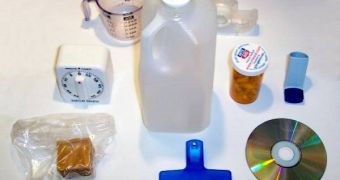Despite the fact that the Food and Drug Administration mysteriously seems to find nothing wrong with it, a growing body of researchers is urging people to avoid purchasing products containing the plastic compound bisphenol A (BPA). In a scientific statement issued on Wednesday, the Endocrine Society of the United States advised authorities and independent researchers to conduct more studies into the dangerous chemical, which apparently adversely affects the hearts of women, and can cause massive DNA damage in unsuspecting mouse models.
Over the past few years, a growing number of politicians in the US have been campaigning for the banning of BPA, and large numbers of consumers have already started shunning it from their shopping carts, Reuters informs. The chemical, which is used for smoother receipts and for stiffening plastic bottles, was found in recent studies to pour into the human body from a variety of unidentified directions, and health experts fear that accumulations could cause a host of medical problems in people.
“We present evidence that endocrine disruptors [of which BPA is a part] do have effects on male and female development, prostate cancer, thyroid disease, cardiovascular disease,” the President of the Endocrine Society, University of Virginia expert Dr. Robert Carey, said at a press conference.
“We exposed some mice to bisphenol A and then we looked at their offspring. We found that, even when they had a brief exposure during pregnancy, mice exposed to these chemicals as a fetus carried these changes throughout their lives,” Yale University scientist Dr. Hugh Taylor, who determined in experiments that BPA could harm unborn offspring in the rodents, added.
Taylor explained that the chemicals in BPA did not cause the nucleic acid to mutate directly. Rather, they attach themselves to the helix-shaped strands and cause a change in their functions. The damage was permanent and could not be reversed throughout the life span of the individual, he added. Last year, a British study showed that high concentrations of BPA were directly connected to the development of a number of conditions, including heart diseases, diabetes, and afflictions of the human liver.
The Endocrine Society admits that the evidence it has is not overwhelming, but it is worrying, experts pinpoint. The situation is also curious, because studies conducted by the FDA have thus far revealed no signs of adverse effects of BPA in humans, which raises some questions about the agency's ability to conduct unbiased and accurate scientific research.

 14 DAY TRIAL //
14 DAY TRIAL //